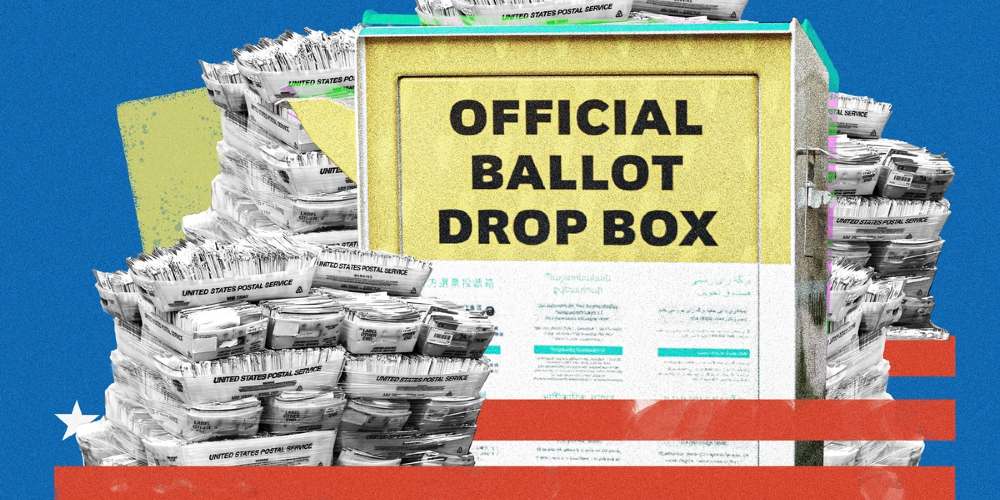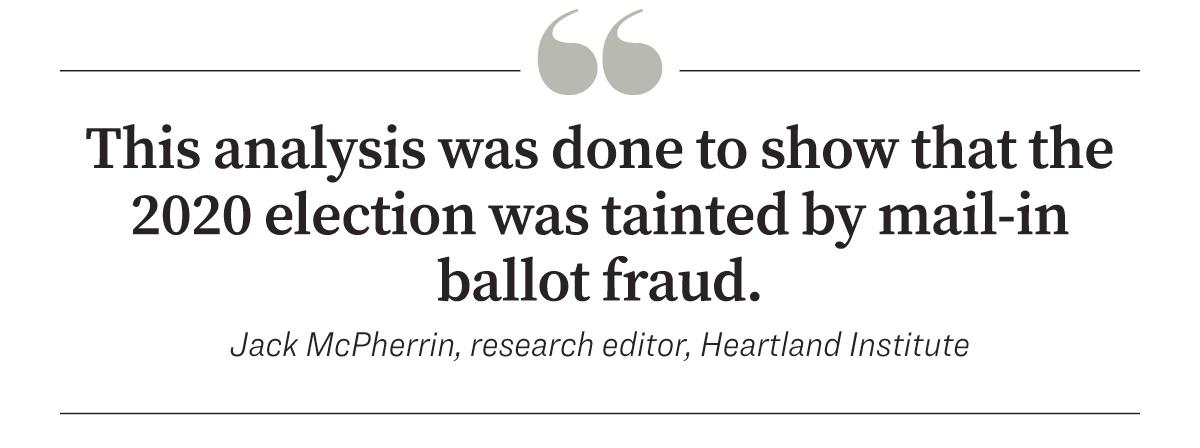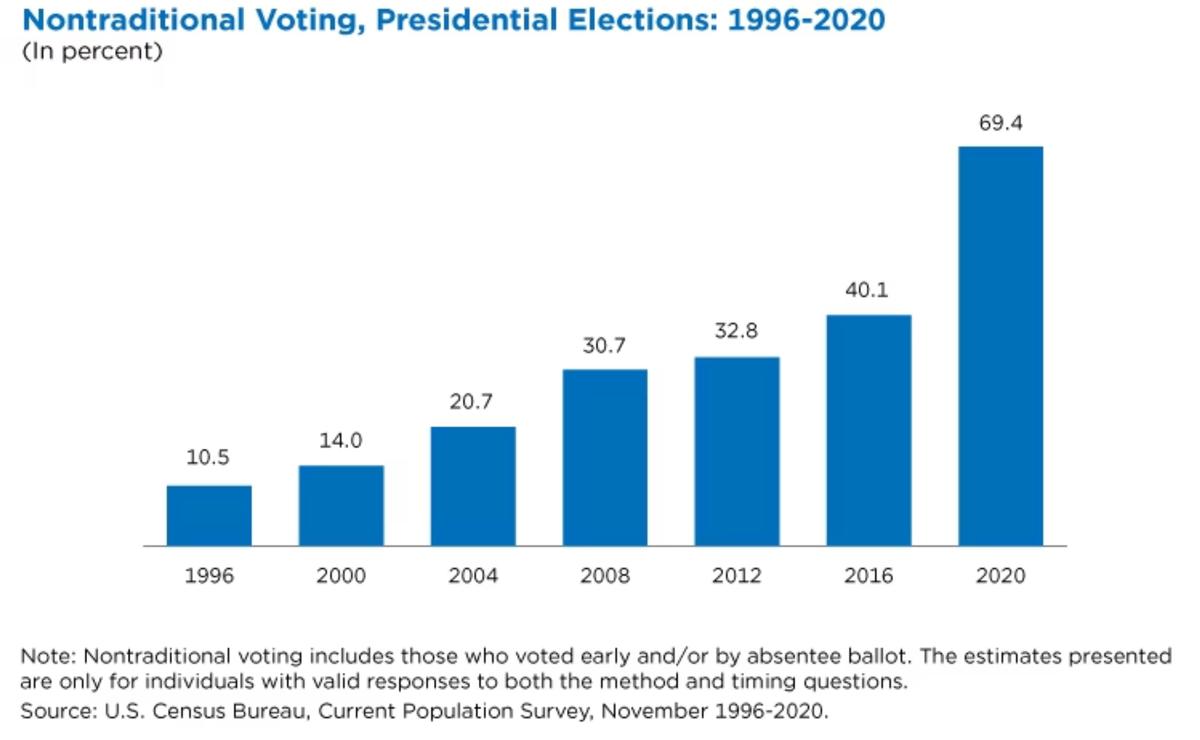(The Epoch Times)—As states gear up for highly consequential elections this fall, one of the most critical factors in the United States is the rise of mass mail-in voting.
According to the Census Bureau, 43 percent of American voters cast ballots by mail in 2020, double the 21 percent who did so in 2016.
While 2020 was an exceptional year because of the government’s response to the COVID-19 virus, the United States is nonetheless experiencing a longer-term transition to an absentee ballot system from an in-person system. Currently, California, Colorado, Hawaii, Nevada, Oregon, Utah, Vermont, Washington, and the District of Columbia have “mostly mail voting” systems, according to an analysis by the National Conference of State Legislatures (NCSL).
And while the 2020 election saw record levels of voter turnout, the shift away from traditional voting methods also coincides with a decline in trust in America’s electoral system. An October 2023 poll by the Public Affairs Council, found that only 37 percent of Americans believe the 2024 elections will be both “honest and open,” while 43 percent expressed “serious doubts” about election integrity.
This loss of trust raises the question of whether the problem stems from losing candidates charging that the elections were stolen from them, or from America transitioning to a system that prioritizes convenience from one that prioritized integrity.
Many pundits claim there is no tradeoff between the two and government officials, notably the Cybersecurity and Infrastructure Security Agency, called the 2020 election “the most secure in American history.”
However,, a large number of Americans, particularly Republican and Independent voters, remain unconvinced.
The NCSL cautions that “if a voter is marking a ballot at home, and not in the presence of election officials, there may be more opportunity for coercion by family members or others.”
According to a recent NCSL study, 28 states, including the key swing states of Arizona, Georgia, Pennsylvania, Michigan, and Wisconsin, currently offer “no-excuse” absentee voting, which means that any voter can request and cast an absentee ballot without offering a reason.
In addition, California, Colorado, Hawaii, Nevada, Oregon, Utah, Vermont, and Washington, D.C., automatically mail absentee ballots to all voters.
In the remaining 15 states, voters must provide an acceptable excuse (such as illness or disability, or being overseas on Election Day) to qualify for an absentee ballot.
The Heritage Foundation, a conservative think tank that keeps a running tally of proven cases of voter fraud, has documented more than 1,500 cases to date and 1,276 criminal convictions.
“Each and every one of the cases in this database represents an instance in which a public official, usually a prosecutor, thought it serious enough to act upon it,” the report states. “And each and every one ended in a finding that the individual had engaged in wrongdoing in connection with an election hoping to affect its outcome—or that the results of an election were sufficiently in question and had to be overturned.”
According to Hans von Spakovsky, senior legal fellow at the Heritage Foundation, the numbers cited in the report are probably an understatement.
“The thing about these 1,500 cases is that they’re clearly just the tip of the iceberg because fraud is very hard to detect,” he told The Epoch Times. “A lot of times it’s just found by accident, particularly in a state like New York or California where there’s no voter ID requirement at all.”
Many of these cases cited in the report involved the fraudulent use of absentee ballots. In the case of one Michigan resident who was convicted of voter fraud, “an employee at an assisted living facility, completed roughly two dozen absentee voter applications, forging individual signatures of residents.”
However, the left-leaning Brennan Center for Justice, an affiliate of New York University, criticized what it said was the “myth of voter fraud.”
“Politicians at all levels of government have repeatedly, and falsely, claimed the 2016, 2018, and 2020 elections were marred by large numbers of people voting illegally,” the institute said in a report. “However, extensive research reveals that fraud is very rare, voter impersonation is virtually nonexistent, and many instances of alleged fraud are, in fact, mistakes by voters or administrators.
“The same is true for mail ballots, which are secure and essential to holding a safe election amid the coronavirus pandemic,” its report states.
In the manic weeks following the 2020 election, data analytics expert Ken Block, president of Simpatico Software Systems, was hired by the Trump campaign to data-mine for voter fraud in the key states of Georgia, Pennsylvania, Arizona, Nevada, Michigan, and Wisconsin, and find “factual, hard evidence that can underpin successful legal challenges.”
“It started with assessing the deceased voters and duplicate voters,” Mr. Block told The Epoch Times. “We looked at every single mail-in ballot cast in the swing states, looking for deceased voters.
”We found, in terms of actual deceased voters that we could confirm through data, a couple of dozen.”
Mr. Block said he found a small number of people who voted twice, typically wealthy individuals who had two residences, but the cases of detected fraud were not nearly enough to sway the election. He was also asked by the Trump campaign to investigate various “hearsay claims” of voter fraud.
“We looked at every single voter fraud claim, and I was able to show with evidence and proof why it was flawed, or just completely wrong in the first place, and those findings were accepted by [President Trump’s] lawyers,” he said. “I think it’s crucially important that everybody understands how hard we looked and how important it was, from a legal standpoint, that the claims of fraud that I evaluated were looked at as hard, if not harder than the defense attorneys who would be fending off these lawsuits.”
And yet, despite all efforts to assure the public that elections are sound, many Americans continue to suspect that something is amiss.
While some instances of voter fraud may be detectable in data and audits, others, such as whether voters are noncitizens, or engaging in ballot harvesting, or illicitly filling out ballots on behalf of others, are more difficult to detect unless witnessed in person or caught on camera.
A particular issue with mail-in ballots is the proliferation of ballot drop-off boxes since 2020, few of which are monitored.
According to Mollie Hemingway, editor-in-chief of The Federalist, and others who analyzed the 2020 election, the funding and locations of many ballot drop boxes in 2020 was directed by an organization called the Center for Tech and Civic Life, backed by hundreds of millions of dollars from Facebook founder Mark Zuckerberg.
Ms. Hemingway argued in her book, “Rigged,” that the donations from Mr. Zuckerberg, called “Zuck Bucks,” were partisan and focused on swing states.
The influence of private money in state electoral systems has only heightened the suspicions of many Americans.
-
The Importance of Prayer: How a Christian Gold Company Stands Out by Defending Americans’ Retirement
A 2021 report from the Massachusetts Institute of Technology (MIT) Election Lab states that “even many scholars who argue that fraud is generally rare agree that fraud with VBM [vote-by-mail] voting seems to be more frequent than with in-person voting.
“There are two major features of VBM that raise these concerns,” the report states. “First, the ballot is cast outside the public eye, and thus the opportunities for coercion and voter impersonation are greater.
“Second, the transmission path for VBM ballots is not as secure as traditional in-person ballots. These concerns relate both to ballots being intercepted and ballots being requested without the voter’s permission.”
The report cites, among others, the case of a campaign manager in a North Carolina congressional race who collected empty mail-in ballots and then filled them in for his own candidate. Ultimately, that led to the election being overturned.
Don’t just survive — THRIVE! Prepper All-Naturals has freeze-dried steaks for long-term storage. Don’t wait for food shortages to get worse. Stock up today. Use promo code “jdr” at checkout for 25% off!
A recent study by the Heartland Institute infers from a voter survey that mail-in ballot fraud likely occurred in large enough numbers to have swayed the 2020 presidential election.
The study found that, in swing states, mail-in votes in 2020 heavily favored candidate Joe Biden, typically outnumbering mail-in votes for President Donald Trump by 2 to 1. Based on a 2023 survey of 1,000 voters conducted jointly with Rasmussen Reports, Heartland found that 28 percent of respondents said that they had voted in a way that could be illegal, including filling out ballots for others, forging signatures, or voting in states where they weren’t permanent residents.
By removing 28 percent of mail-in ballots from both candidates in the swing states of Arizona, Georgia, Michigan, Nevada, Pennsylvania, and Wisconsin, Heartland calculated that Trump would have won the Electoral College, 311–227.
Critics of this study have countered that the framing of the questions may have confused those being surveyed. Filling out ballots for others, for example in the case of a blind or disabled family member, isn’t always illegal.
Critics also questioned whether respondents to the survey may have confused request forms to receive mail-in ballots—to which the voter fraud issues don’t apply—with the actual ballots themselves.
To allow for error, however, Heartland reduced the number of disqualified votes to 3 percent from 28 percent and calculated that President Trump would still have won the Electoral College, 279–259.
“It’s not worth re-litigating the 2020 election,” Jack McPherrin, a research editor at the Heartland Institute and one of the study’s authors, told The Epoch Times. But he says that claiming the 2020 election was the most secure in U.S. history is “a pretty ridiculous assertion.”
“This analysis was not done to say Trump is our rightful president,” Mr. McPherrin said. “This analysis was done to show that the 2020 election was tainted by mail-in ballot fraud so that we can fix it moving forward.
“It just provides a great avenue for fraud because there are so few restrictions and policies in place to prevent it,” he said. “Those policies were intentionally relaxed in 2020 in many states, and that opened the floodgates for fraud to occur.”
Asked how he could reconcile his findings with investigations that indicated voter fraud was exceedingly rare, he said that “mail-in ballot fraud is extremely difficult to prove.”
One aspect of mass mail-in voting that causes particular concern is ballot harvesting, or the process of private citizens or organizations collecting and submitting ballots on behalf of others, outside of the supervision of election officials.
According to a 2022 report authored by Mr. von Spakovsky, the potential for voter fraud “is made worse in the many states like California that allow vote trafficking, which proponents of mail-in voting call ‘vote harvesting’ because that sounds better.”
Every state allows absentee ballots to be mailed back or delivered personally to election officials by voters, their immediate family members, or a designated caregiver, he notes.
“But vote-trafficking states allow any third-party stranger to go to voters’ homes to pick up and deliver their ballot,” the report states.
“In other words, these states give political actors with a stake in the outcome of the election the ability to handle a very valuable commodity—the ballots that can ensure the victory (or defeat) … of the candidates who they work for and support, giving them the opportunity to complete, alter, or simply fail to deliver those ballots.”
Advocates of mail-in voting counter that states that have all-mail elections typically require voters to sign the envelope in which the ballot is mailed and then match it with the signature in the state’s voter rolls. In addition, they say, many counties place bar codes on ballot envelopes that can be tracked by the U.S. Postal Service.
How bar codes would track votes in the case of ballot drop boxes is unclear, however. And according to the NCSL, only 31 states verify signatures on mail-in ballots, and 10 states and Washington, D.C., verify that a mail-in ballot envelope has been signed but don’t conduct signature verification.
With the November election fast approaching, what can be done to restore trust among American voters so that, whoever wins, the result is accepted by both parties as legitimate and fair?
Mr. von Spakovsky has proposed systematic election audits as one solution. Typically, he said, post-election analyses amount to hand recounts of ballots, but don’t verify if all ballots cast were legitimate.
He proposes pre-election audits of voter rolls to ensure that all registered voters are eligible to vote. He also proposes, among other things, equipment audits to ensure voting machines are accurate, procedure audits to ensure that election laws were followed, and chain-of-custody audits for ballots.
While it may be impractical to conduct full audits of every voting district, Mr. von Spakovsky proposed a model adopted in Texas where a minimum number of randomly selected districts are audited each election cycle, and additional audits conducted where credible cases of malfeasance have been charged.
Election audits have received some pushback from Democrats, Mr. von Spakovsky said. The Biden administration initially sued to block the process of post-election audits, claiming that it was voter intimidation and a violation of the Voting Rights Act.
“I think that was a purely partisan decision,” he said. To date, the Justice Department hasn’t pursued this claim further.
Many also propose tightening up ID requirements, despite the objections of organizations such as the American Civil Liberties Union and the Brennan Center, which consider it voter suppression.
Subscribe for free to the America First Report newsletter.
“We strongly recommend that a state not only have ID requirements for in-person voting, but that they also have it for absentee balloting,” Mr. von Spakovsky said. “While a family member might have the ID of someone that they’re voting for in their family, it might make it more difficult for strangers to be able to do that.”
Currently, seven states require the signature of a witness on absentee ballots, in addition to the voter’s signature, and three states—Mississippi, Missouri, and Oklahoma—require the absentee ballot envelope to be notarized. In Arkansas, a copy of the voter’s ID must be returned with the absentee/mail ballot.
Proof of U.S. citizenship is another area where illegal voting is hard to detect, as there are no nationwide databases of citizenship. Audits to confirm citizenship sometimes rely on purchases of data banks from credit agencies, but that would not include those who do not have loans or credit cards, including many students.
This is complicated by the fact that many states provide driver licenses to noncitizens, and some states allow noncitizens to vote in local elections.
In addition, a 2013 Supreme Court ruling in the case of Arizona v. Intertribal Council of Arizona barred states from requiring proof of U.S. citizenship in federal elections. According to the decision, states can “require only that an applicant aver, under penalty of perjury, that he is a citizen.”
According to Mr. Block, another challenge that the electoral system faces is the sheer variety of voting regulations, not only among states, but among counties as well. There are more than 5,000 different voting jurisdictions across the United States, he said.
“We have a basic framework problem in the way that we’re organized and the infrastructure that we have,” he said. “It lacks the basic things we need for integrity in terms of ensuring people can’t vote twice, ensuring that deceased voters are efficiently removed from voter rolls, etc.”
Given that there is now less than a year before the election begins, analysts say that the 2024 election will likely proceed under election rules and systems that are similar to those in 2020, despite the absence of a pandemic. And if the election is close, as many expect it will be, many will continue to mistrust the outcome.
Mr. McPherrin argues the United States is capable of going back to a system where the majority of people, on election day present ID, vote in person, and the country knows the results by the next day.
“It’s absurd to think we can’t do that,” he said. “We’ve done that many times in the past and we can continue to do that moving forward; we just need to revert back to the systems that we had in place in 2016, 2012, and 2008.
“What can be more important than ensuring election security in a democratic republic?” Mr. McPherrin said. “I can’t think of a single other thing that’s more important because it’s the foundation of our entire constitutional republic, and without secure elections, we will not have a functioning democratic republic for much longer.”
What Would You Do If Pharmacies Couldn’t Provide You With Crucial Medications or Antibiotics?
The medication supply chain from China and India is more fragile than ever since Covid. The US is not equipped to handle our pharmaceutical needs. We’ve already seen shortages with antibiotics and other medications in recent months and pharmaceutical challenges are becoming more frequent today.
Our partners at Jase Medical offer a simple solution for Americans to be prepared in case things go south. Their “Jase Case” gives Americans emergency antibiotics they can store away while their “Jase Daily” offers a wide array of prescription drugs to treat the ailments most common to Americans.
They do this through a process that embraces medical freedom. Their secure online form allows board-certified physicians to prescribe the needed drugs. They are then delivered directly to the customer from their pharmacy network. The physicians are available to answer treatment related questions.









Democrats have master the mail-in ballot fraud scam. I don’t think Republicans can compete with their organized ballot harvesting and fraud. Republicans want to do it legally, democrats will break the law any way they can to cheat. That is their history. That is their AMORAL way in life.
as republicans do nothing.